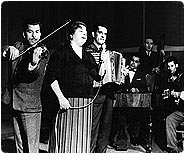|
|
 |
 Weddings, Cafés, and Romica Puceanu’s Teapot Full of Cognac: The Billie Holiday of Romania Returns from the Archives
Weddings, Cafés, and Romica Puceanu’s Teapot Full of Cognac: The Billie Holiday of Romania Returns from the Archives
In 1996, Romanian singer Romica Puceanu, the beloved balladeer of Bucharest’s Rom, or Gypsies, died suddenly and unexpectedly in a car accident on her way home from a wedding performance. Though “greatly admired by those who knew her singing,” according to anthropologist Robert Garfias, “she was, nonetheless, the unfortunate victim of a number of circumstances which prevented her from receiving the acclaim which she deserved.” Puceanu so loved singing to her own people, mostly at cafes and traditional weddings in the urban ghettos of Romania, that the rest of the world has been unaware of her music… until now.
Asphalt Tango Records is unearthing some of Eastern Europe’s musical treasures, re-issuing old records that are hard to get outside their countries of origin. Romica Puceanu & The Gore Brothers: Sounds From a Bygone Age, Vol. 2 is the latest in this eponymous series, aimed at introducing international audiences to the great voices of Eastern and Gypsy music.
Like some of the great divas of her age, Puceanu boasted a larger than life personality. Mark Hudson of the UK Telegraph, describes her as “Simultaneously seducing, comforting and cajoling… like a Balkan Marlene Dietrich.” She was the voice of the Gypsy blues, who gave voice to the life of the poor suburbs of Romanian towns in the same era that Billie Holiday, Nina Simone, and Sarah Vaughn were doing the same for Black urban neighborhoods across the Atlantic. Her signature was the slow improvised mournful ballad, which she filled with expressive melismas, ornaments, and incredible soul. Her voice reached from the Roma ghettos to the parlors of Eastern European intelligentsia, earning her a reputation as the “Billie Holiday of the East.”
Romica sang melodies with stirring words, in which she described the everyday life, longings, and sufferings of the simple folk. Following the abolition of slavery in 1864, many homeless Gypsies settled on the outskirts of southern Romanian towns. These quarters on the border between the town and the country were referred to as “mahalas” and it was here that the “cantece de mahala” - the songs of the suburbs - originated. The repertoire of this Gypsy music, known as lautari, comprised pieces from a rustic environment, interpreted with great virtuosity and urbane arrangements for a very mixed audience in the town.
The Gore Brothers (Aurel and Victor, who played violin and accordion respectively), discovered the talented young Romica in their own family. They and their band, the Taraful Fratii Gore, were already a success when they discovered their 14-year old cousin singing in local cafes on the outskirts of Bucharest. Thus began a long professional and familial collaboration. The brothers began to arrange gigs for her, mostly playing at weddings in their neighborhood. Nobody who wanted to celebrate an old-style wedding got past the Gore “firm” until Aurel Gore’s death shortly before the revolution in December 1989. Victor remembers, “When we played slow, sad songs the Gypsies wept, and nobody could eat a thing!”
In spite of her talent for bringing her audiences to tears, Puceanu was a lively, funny woman, who never turned up at the studio without her teapot filled with cognac. When one of the sound engineers noticed during a studio take that she was holding her words the wrong way up and mentioned this to her, Romica replied: “Would I ever have sung with these men [the Gore Brothers] if I could read?”
By the sudden, tragic end of her life, Romica Puceanu had become the most popular and best paid singer of her genre, and was considered the veritable incarnation of Romanian lautari music. The Taraful Fratii Gore sold thousands of records in Romania up to the present day, but never achieved great wealth. Victor Gore lives today in a small two-room apartment in Bucharest and relives his memories of the golden years of the old days. After years of watching fan letters pile up, begging for a new Gore record, we are blessed with this sparkling gem from the archives, bound to illuminate the modern soundscape.
|
|
 |
|
|
|